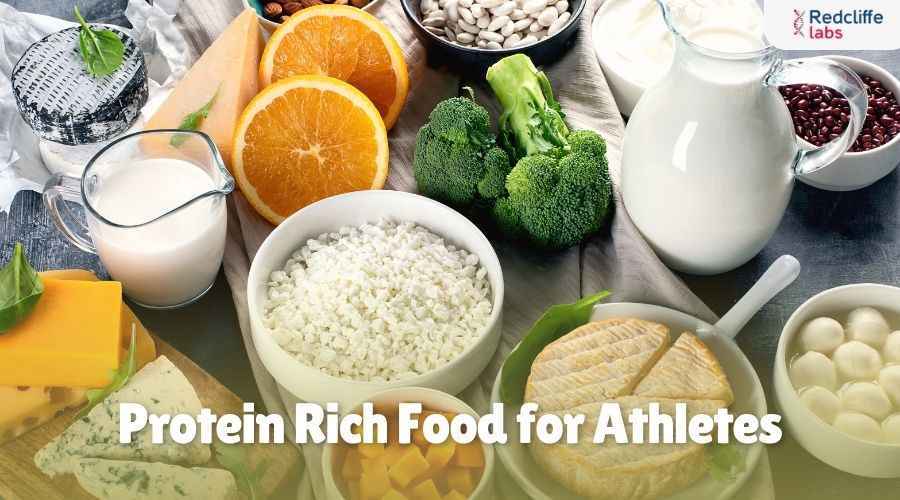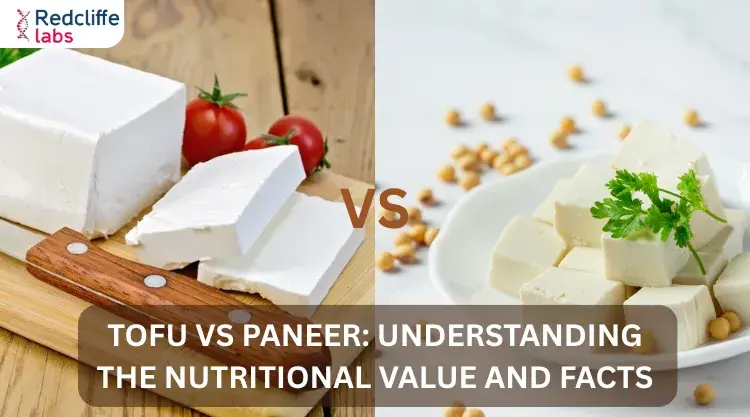Protein-Rich Foods for Athletes: Fuel Your Performance

Medically Reviewed By
Dr. Geetanjali Gupta
Written By Kirti Saxena
on Dec 18, 2024
Last Edit Made By Kirti Saxena
on Jul 19, 2025

If you are a professional sportsperson, athlete, fitness enthusiast, or someone who simply wants to know the role of protein in diet, then you have landed on the right page. Athletes require a protein-rich, balanced diet to manage their daily activities, which include physical exercises, training, and more. Protein is vital for muscle recovery, growth, and overall energy.
Protein-rich foods can significantly improve daily life. This blog will discuss the best protein-rich food options for athletes, their benefits, and how to include them in your meals to increase peak performance.
Unlike glucose, which your body synthesizes even if you do not eat carbohydrates, your body cannot create protein from other sources. Protein insufficiency could cause your body to break down proteins to get the amino acids needed to function.
Role of Protein in Athletic Performance
Here is why protein is so important in athlete performance-
Improves Endurance—Athletes often participate in physical activities like marathons or cycling. Their bodies are heavily dependent on protein to sustain performance. Protein helps delay muscle fatigue and supports recovery from prolonged activity.
Improve Strength and Power—Protein helps muscle hypertrophy and power generation in strength-based sports and training. It also ensures that your muscles function optimally.
Preventing Injuries: Protein supports tendons, ligaments, and muscles and helps reduce the risk of injury during intense athletic activities.
Supporting Metabolism- Protein is crucial for metabolic processes that enable energy production and utilization, which improves performance.
Why is Protein Important for Athletes?
Protein is crucial for athletes for several reasons. Here are some reasons-
- Energy Supply: Carbohydrates are the primary energy source, and protein is the backup fuel during prolonged exercise or sports activity.
- Enzyme and Hormone Production: Protein is necessary for enzymes and hormones that regulate metabolic functions and muscle recovery.
- Immune Support: A protein-rich diet boosts the immune system, keeping athletes healthy.
How Much Protein Do Athletes Need?
The protein requirement depends on the type of sport, intensity of training, and individual goals. General guidelines include:
- Endurance Athletes- 1.2 g–1.4 grams per kilogram of body weight daily.
- Strength Athletes: 1.6–2.0 grams per kilogram of body weight daily.
- Recreational Athletes: 1.0–1.2 grams per kilogram of body weight
For example, a 70 kg endurance athlete requires 84–98 grams of protein daily, while a strength athlete of the same weight might need 112–140 grams.
Best Sources of Protein for Athletes
Animal-Based Protein Sources for Athletes
| Food Item | Protein Content (per 100g) | Benefits | Best Ways to Consume |
| Chicken Breast | 31g | Low-fat, lean protein ideal for muscle building | Grilled, baked, or steamed |
| Eggs | 6g per large egg | Complete protein with all essential amino acids | Boiled, scrambled, or as omelets |
| Salmon | 22g | Rich in omega-3 fatty acids, supports muscle recovery | Grilled, baked, or poached |
| Tuna | 25g | High protein, low fat, ideal for lean muscle growth | In salads, sandwiches, or grilled |
| Greek Yogurt | 10g | High protein with probiotics for gut health | As a snack, smoothie base, or dessert |
| Milk (Whole) | 3.4g | Source of casein and whey supports muscle repair | As a drink or added to smoothies |
| Cottage Cheese | 11g | Slow-digesting protein (casein) promotes overnight recovery | Paired with fruits or as a salad topping |
| Beef (Lean Cuts) | 26g | High in iron and zinc, essential for energy and recovery | Grilled, broiled, or stir-fried |
| Turkey Breast | 29g | Low-fat, lean protein is great for post-workout meals | Roasted, grilled, or in sandwiches |
| Shrimp | 24g | Low in calories, high in protein, rich in selenium | Boiled, grilled, or stir-fried |
| Pork Loin | 27g | Lean protein with essential vitamins like B12 | Grilled or roasted |
| Cheese (Cheddar) | 25g | High protein, calcium-rich, supports bone health | Moderately as snacks or in meals |
Plant-Based Proteins for Athletes
| Plant-Based Protein | Protein Content (per 100g) | Benefits | Best Ways to Consume |
| Lentils | 9g (cooked) | - High in fiber for sustained energy - Supports muscle recovery | - Add to soups or stews - Use in curries or salads |
| Chickpeas | 15g (cooked) | - Provides long-lasting energy - Rich in iron for oxygen transport | - Roast for snacks - Blend into hummus |
| Quinoa | 8g (cooked) | - Complete protein with all essential amino acids - Gluten-free | - As a salad base - Mixed with vegetables |
| Tofu | 15-20g | - Low in saturated fat - Rich in calcium for bone health | - Stir-fried with vegetables - Added to soups or grilled |
| Tempeh | 19g | - Fermented, improving gut health - High in magnesium for muscle relaxation | - Pan-fried or baked - Added to sandwiches or salads |
| Edamame | 11g | - Rich in folate for cell repair - Contains antioxidants | - Steamed as a snack - Added to rice or noodle dishes |
| Chia Seeds | 5g | - Contains omega-3 fatty acids - High in fiber for digestion | - Sprinkle on oatmeal - Blend into smoothies |
| Hemp Seeds | 31g | - Complete protein - Rich in omega-6 and omega-3 fatty acids | - Add to yogurt - Use in protein bars |
| Black Beans | 8g (cooked) | - High in antioxidants - Supports heart health | - Use in burritos - Add to soups or salads |
| Pumpkin Seeds | 19g | - Rich in zinc for immune support - Contains magnesium | - Eat as a snack - Sprinkle over salads or oatmeal |
| Almond Butter | 21g | - High in vitamin E for skin and muscle recovery - Energy-dense | - Spread on whole-grain bread - Add to smoothies |
| Peas | 5g (cooked) | - Low-calorie protein source - Rich in vitamins A and K | - Add to soups - Use in veggie stir-fries |
| Spirulina | 57g (per 100g powder) | - Extremely protein-dense - High in iron and B vitamins | - Blend into smoothies - Add to water or juice |
Tips to Add Protein In Diet for Athletes
Here is how you can add protein to your daily diet-
- Start your Day with Protein. For breakfast, you can eat eggs, tofu, or Greek yogurt. You can also consume chia seeds, nut butter, or oatmeal.
- Include Protein in Every Meal—Focus on a balanced diet with an appropriate amount of protein at every meal. You can consume lean meat, fish, legumes, or tofu.
- Use Protein Snacks Wisely: Choose protein-rich snacks like hard-boiled eggs, roasted chickpeas, or nuts. You can also try protein bars, but ensure they are low in sugar.
- Plan Post-Workout Protein- Consume a protein source within 30 minutes to 2 hours after exercise for optimal muscle recovery. Ideal options include a protein shake, chocolate milk, or grilled chicken with sweet potatoes.
- Stay Hydrated- Drinking more water helps metabolize protein and supports recovery.
- Experiment with New Recipes- Make high-protein snacks like energy balls with oats, nuts, and protein powder.
Common Myths About Protein for Athletes
Myth 1: More Protein Equals More Muscle
Excess protein won’t directly lead to more muscle. Consuming more than your body needs can be stored as fat.
Myth 2: Only Animal Protein is Effective
Plant-based proteins are equally effective for muscle repair and growth when combined correctly.
Myth 3: Supplements Are Necessary
Supplements are convenient, but natural protein sources can also meet your daily needs with proper planning.
High-Protein Diet Plan for Athletes
|
Meal |
Food Items |
Protein Content (Approx.) |
|
Breakfast |
Scrambled eggs (3 eggs) with spinach and whole-grain toast |
20g |
|
Greek yogurt (1 cup) with chia seeds (1 tbsp) and mixed berries |
15g | |
|
A glass of milk (1 cup) |
8g | |
|
Mid-Morning Snack |
Roasted chickpeas (1 cup) |
15g |
|
A handful of almonds (10-12 pieces) |
6g | |
|
Lunch |
Grilled chicken breast (100g) |
31g |
|
Quinoa (1 cup cooked) |
8g | |
|
Steamed broccoli and carrots (1 cup) |
4g | |
|
Afternoon Snack |
Peanut butter (2 tbsp) on whole-grain crackers (4 pieces) |
10g |
|
Hard-boiled eggs (2 eggs) |
12g | |
|
Pre-Workout |
Banana with a tablespoon of almond butter |
5g |
|
Protein smoothie (1 scoop of whey protein, almond milk, and frozen fruits) |
20g | |
|
Dinner |
Grilled salmon (100g) |
25g |
|
Sweet potatoes (1 cup mashed) |
4g | |
|
Roasted asparagus (1 cup) |
3g | |
|
Post-Workout |
Protein shake (1 scoop of whey protein with water or milk) |
20g |
|
Evening Snack |
Cottage cheese (1 cup) with a handful of walnuts |
15g |
|
Dark chocolate (1 small square) |
1g |
The Final Words
Protein is vital to diets; it supports muscle repair, recovery, and overall performance. Add protein-rich foods, from lean meats to plant-based options, to meet your nutritional needs while keeping your meals exciting and balanced. Consult your dietician or nutritionist to create a personalized diet plan that can cater to all your specific goals and ensure long-term success. However, whether you're a professional athlete or an active enthusiast, prioritize protein intake to stay fit.
FAQs
Q: Can vegetarian athletes fulfill their protein needs?
A: Yes, of course. Vegetarians can also fulfill their protein requirements with plant-based proteins, such as legumes, quinoa, and soy.
Q: Should protein be consumed on rest days?
A: Yes. You can consume protein on rest days, as your muscles are actively recovering and repairing even when you're not exercising. However, protein intake is just as important for muscle maintenance and recovery on rest days as on training days.



